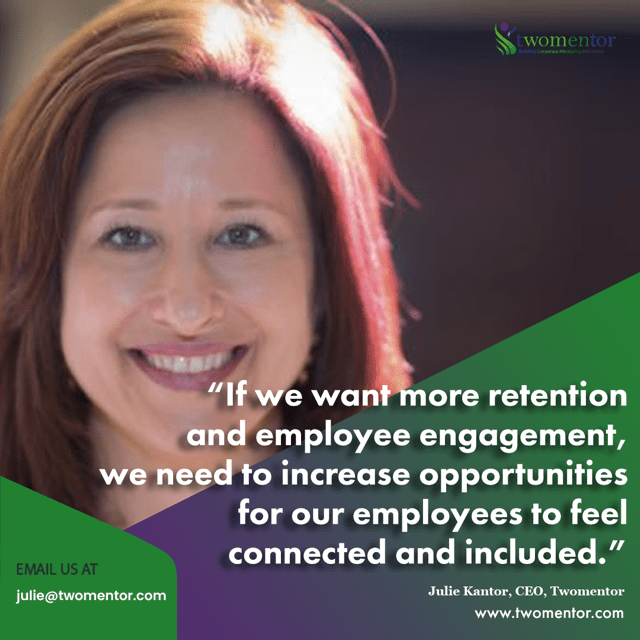5 Benefits of Mentoring in the Legal Profession
Let’s face it, we know we are dealing with a mental health epidemic and the hybrid work environment has made us more productive, but less sane. Here is our prior article on this topic.
We’ve decided to look at how to bridge the loneliness + quite quitting gap in many industries and look at the role (ROI) that faster-tracking human connection through mentoring can foster.
According to research by the Association of Talent Development, businesses that offer mentoring programs at work experience a 57% increase in employee engagement and retention.
This demonstrates how mentoring programs can significantly impact the company’s ability to recruit and retain top talent.
Since they offer unique advantages necessary for both professional and personal development, mentoring relationships are particularly crucial for those working in the legal profession.
In a job as demanding as law, where burnout and stress may routinely take their toll, mentoring emerges as a valuable tool to help people through obstacles, boost skill development, and foster resilience.
Below we have listed five benefits of Mentoring in the Legal Community. So, let’s begin.
1] Personal and Professional Growth
Programs for mentoring offer strategies to nurture and develop different talents. Employees are more likely to stick with your company if they have a mentor to help them develop professionally. According to Training Magazine, people who have mentors retain information 50% more than those who don’t.
The sharing of knowledge, abilities, and experiences between mentors and mentees is fostered by strong and trusted relationships. As a mentee, you can improve your confidence, communication skills, organizational ability, critical thinking abilities, and study techniques.
These skills, which align with what law firms look for in new hires, are essential for the mentee’s personal growth and significantly increase their appeal to potential employers. In addition to helping others, mentors develop themselves as well by strengthening their leadership capabilities and personal development. Most mentors state mentoring increases personal satisfaction as well as a greater desire to stay at their companies.
2] Reducing Burnout
According to a poll conducted in the fourth quarter of 2021, lawyers are becoming more burned out. In fact, in a poll conducted by Bloomberg Law, administrated quarterly since 2020, showed lawyers reported experiencing burnout almost 50% of the time at work!
Burnout and high levels of stress can come from the demanding nature of the legal profession, which can have a negative impact on mental health. Legal mentors are crucial in assisting mentees in identifying burnout symptoms, training them in stress-reduction strategies, and promoting the value of self-care. Mentors help mentees keep better mental health by teaching coping mechanisms and emotional support.
3] Enhanced Social Skills and Networking
Mentoring nurtures not only legal skills but also social skills crucial for success in the legal field. Building a strong mentor-mentee relationship demonstrates the ability to establish rapport and foster meaningful connections – qualities highly prized by law firms seeking lawyers who can relate to clients and understand their unique needs. Legal is a people business. People who trust others are often the door openers to future opportunities. In this vein, we have seen more industry association-driven mentor initiatives.
Mentors, in turn, expand their own networks within the legal industry, forging valuable connections that can influence their careers positively, their billable utilization, and their company’s bottom lines.
3] Broadened Perspective and Innovative Thinking
An excellent example of such an initiative can be seen at Baker McKenzie, a leading global law firm. Recognizing the power of diverse perspectives in driving innovation, the firm developed a comprehensive mentorship program with an emphasis on inclusion and belonging.
The firm believes in promoting a culture where everyone has an equal opportunity to succeed, reflected in their mentoring objectives. The program pairs junior attorneys with experienced partners who offer guidance, support and share invaluable insights from their journey in the legal profession.
Mentoring relationships offer diverse perspectives that enrich problem-solving and innovative thinking. Dialogues between mentors and mentees expose both parties to novel ideas, methods, and viewpoints. This fresh outlook can break down barriers, offering solutions to challenging issues within legal practice, shaping more efficient outcomes, leveraging multi-generational perspectives, and expanding skill sets.

4] Professional Practice and Skill Enhancement
87% of the employees taking part in mentoring programs feel empowered and more confident as a result of their mentoring interactions.
Mentees frequently become more skilled trainees and proteges. The ease of asking a mentor for guidance and feedback is similar (and often more comfortable) to how trainees feel about their interactions with supervisors. This comfort promotes proactive inquiry and gives people the self-assurance to ask for help, which helps legal teams work together effectively and provides the best possible client service.
5] Long-Term Support and Legacy
The great majority of women (85 percent) and multicultural workers (81 percent), according to research from the Center for Talent Innovation (CTI), benefit highly from navigational assistance. You can learn the unspoken norms from mentors, get a map of the unexplored power corridors, and learn “the business behind the business.”
A platform for continual learning and development is provided by mentoring relationships, which offer lasting support. Even when official mentoring sessions are over, the relationship between the mentor and mentee can continue to serve as a solid source of advice and promote resiliency in the face of new problems. The mentoring cycle in the legal community is perpetuated by mentees who have benefited from it moving into mentorship roles.
In essence, mentoring relationships within the legal community go beyond merely imparting knowledge; they act as stimuli for development on all levels—personal, professional, and emotional. Participating in these interactions allows legal professionals to widen their viewpoints, develop resilience against burnout, and set the groundwork for a successful and long-lasting career.
Facilitating mentorship in the legal sector is an investment in your success and the future of the legal community, regardless of whether you elect to be a mentee or a mentor.




